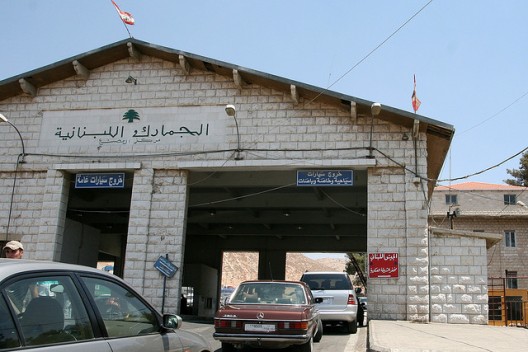 A twenty year-old girl and a ten-year old boy were killed by Syrian government airstrikes last week. It would sound like any other day in Syria, except these strikes took place on the Lebanese side of the border, killing two Lebanese civilians and wounding several others. Porous borders are not new to Lebanon. The Lebanese and Syrian national borders have yet to be properly demarcated, and have never been fully secured. Migrant Syrian workers used to pour into Lebanon, while Lebanese looking for a quiet escape into old Damascus would flow the other way. Such was the way of “brotherly relations” between the two nations. But the onset of the Syrian crisis rendered the Lebanese-Syrian borders outright dangerous. On the Syrian side, government forces have abandoned many of their border posts, leaving the territory unprotected. Increasingly, artillery shells fired from the Syrian side injure or kill civilians on Lebanese land. Syrian Air Force planes continue to penetrate Lebanon’s airspace over the Beqaa, also bringing Lebanese casualties.
A twenty year-old girl and a ten-year old boy were killed by Syrian government airstrikes last week. It would sound like any other day in Syria, except these strikes took place on the Lebanese side of the border, killing two Lebanese civilians and wounding several others. Porous borders are not new to Lebanon. The Lebanese and Syrian national borders have yet to be properly demarcated, and have never been fully secured. Migrant Syrian workers used to pour into Lebanon, while Lebanese looking for a quiet escape into old Damascus would flow the other way. Such was the way of “brotherly relations” between the two nations. But the onset of the Syrian crisis rendered the Lebanese-Syrian borders outright dangerous. On the Syrian side, government forces have abandoned many of their border posts, leaving the territory unprotected. Increasingly, artillery shells fired from the Syrian side injure or kill civilians on Lebanese land. Syrian Air Force planes continue to penetrate Lebanon’s airspace over the Beqaa, also bringing Lebanese casualties.
The effect? The much-feared spillover of the Syrian crisis into Lebanon. Open borders are great for uninhibited entry to fleeing refugees, but seriously threaten the already fragile state of Lebanese security. The deteriorating state of border security in the past year has coincided with the emergence of Lebanese franchises of the al-Qaeda affiliate Jabhat al-Nusra and the Islamic State of Iraq and the Levant (ISIL). These groups, along with the al-Qaeda-inspired Abdullah Azzam Brigades, have claimed responsibility for seven bomb blasts targeting Shiite-majority areas in Lebanon, citing Hezbollah’s involvement in Syria as justification. Pro-Hezbollah political leaders have been assassinated in Tripoli, Beirut, and Lebanon’s south. The violence flows the other way as well: twin suicide blasts struck two Sunni mosques in Tripoli led by pro-revolution sheikhs. Unrestrained by secure borders, Syria’s war is steadily becoming Lebanon’s.
Now more than ever, robust border security is desperately needed. Sadly, Lebanon’s political factions lack the will to make it happen. Hezbollah needs open passages into Syria to move its fighters, weapons, and supplies in and out freely, especially as its operations in Yabrud on the Syrian-Lebanese border and Eastern Ghouta in the Damascus suburbs heat up. In Lebanon’s north, pro-rebel Lebanese Sunnis take advantage of unprotected border areas to join Syrians fighting the regime. Syrian rebel fighters cross into Arsal, a friendly Sunni town across the border from Yabrud, to rest and resupply for their fight. The spillover directly feeds into Bashar al-Assad’s position on the international stage, who promised more than two years ago to “set the Middle East on fire,” using the havoc seeping through the uncontrolled borders with Syria’s smaller neighbor as an example of the alternative to his rule.
With so many factions depending on an open border, the Lebanese Armed Forces (LAF) cannot suddenly shut them without risking extreme blowback. The LAF needs political cover to take on such a tough and controversial operation as border security, and they are well aware they have yet to be granted such permission. Taking an independent decision to close the border to fighters would put the LAF in direct confrontation with Hezbollah—a move that it is both unable and unwilling to do. It is inconceivable for any Lebanese to picture a general security officer standing at a border post, refusing to let Hezbollah fighters into Syria.
Other countries have tried to ameliorate the sad state of Lebanese border security. Last year, the United States donated $8.7 million to the LAF specifically to boost the army’s capacity to control Lebanon’s northeastern borders. Israel, in its own way, has contributed to the containment effort: On February 24, it launched two air raids on Hezbollah bases near the Syrian-Lebanese border, and previously struck weapons convoys in Syria to prevent their transfer to Hezbollah in Lebanon. The message to the LAF is clear: take care of it, or else we will.
These worrisome security incidents brought gallant statements from Lebanese politicians about the importance of Lebanon’s internal stability; the LAF and various security institutions stepped up operations within Lebanese territory as a result. The Lebanese media in the past weeks flooded televisions across the country with news of security forces dismantling car bombs found in Beirut and the Beqaa—but never on the actual Lebanese-Syrian border, from where they ostensibly enter Lebanon.
With an almost insistent determination, the Lebanese political class and security institutions ignore the restive and dangerous Syrian-Lebanese border. So, with even more fury, explosives, weapons, supplies, and fighters continue to stream into Lebanon. After two years of cross-border shelling and nine months of continuous explosions, Lebanon’s borders remain unprotected—and so do its people.
Maya Gebeily is a Beirut-based journalist and analyst covering Lebanon, Syria, and the Middle East.
Image: Lebanese border checkpoint. (Photo: Giorgio Montersino/Flickr)
